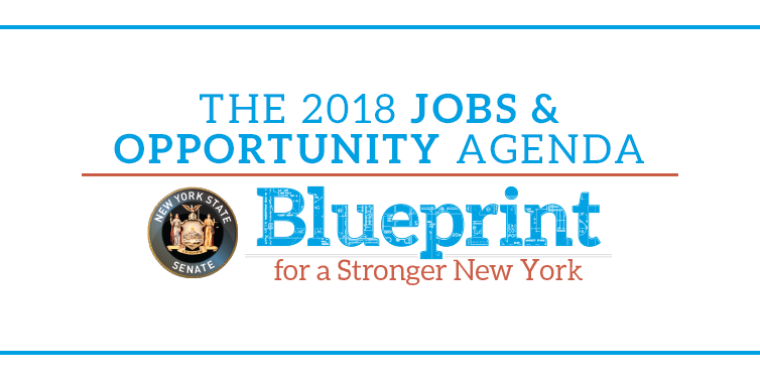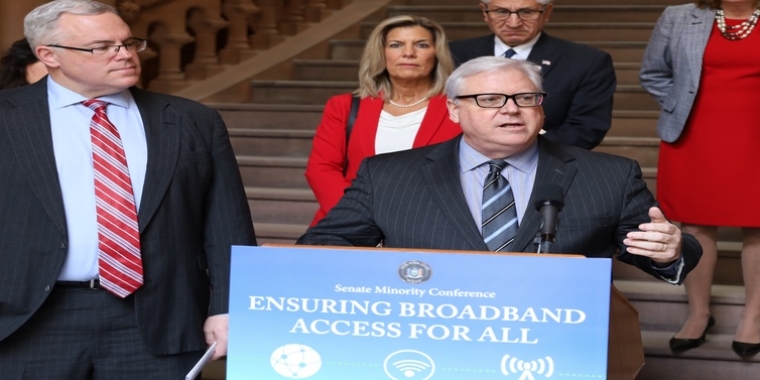
O’Mara, Senate Majority unveil 'Jobs and Opportunity Agenda’: New plan calls for tax cuts, regulatory reform, workforce development, and refocusing of New York State’s economic development strategies
February 13, 2018
-
ISSUE:
- Jobs and Opportunity Agenda

Albany, N.Y., February 13—State Senator Tom O’Mara (R,C,I-Big Flats) today joined his Senate Majority colleagues to unveil a comprehensive “Jobs and Opportunity Agenda” calling for new tax cuts, broad-based regulatory reform, workforce development initiatives, and a major refocusing of the state’s economic development initiatives including shutting down the controversial START-UP New York program.
“New York cannot continue as one of the highest taxed and overregulated states in America. It’s that simple. We’re losing our way again after seven years of the Cuomo administration. We are not saying focused on getting our residents and businesses out from under one of the nation’s heaviest tax and regulatory burdens. The Senate’s focus in 2018 is to reorder New York’s priorities so that we tax less, regulate less, mandate less, and create more and better jobs,” O’Mara said.
The plan unveiled today calls for:
> new tax cuts for small businesses and farms including, among others, increasing the corporate tax threshold from $390,000 to $500,000 and lowering the rate to 2.5 percent. The Senate plan also calls for allowing real property owned by a small business to be eligible for the STAR property tax savings program;
eliminating the two-percent Gross Receipts Tax on utility bills;
> extending the zero percent Corporate Franchise Tax parity to all manufacturers in New York regardless of how they are organized. Currently, only approximately 25 percent of manufacturers – those organized as C corps - can receive the zero percent rate on business income;
> shutting down applications to the START-UP New York program at the end of 2018. Critics of Governor Andrew Cuomo’s START-UP New York strategy argue that it has failed to produce effective job-creating results. O’Mara said that the Senate wants to redirect the $44.5 million in advertising money included in Cuomo’s proposed 2018-2019 Executive Budget to support more effective economic development programs;
> creating an Independent Oversight Panel for all large public work projects and state procurements of $50 million or more;
> curtailing state agency overuse of the emergency regulation process to ensure it is only used in true emergency situations when necessary to protect public health and safety;
reforming the regulatory, licensing, and permitting processes to make them easier to understand, more responsive to business concerns, increase transparency, improve consistency, and reduce overly burdensome or unnecessary requirements;
> creating a state-level small business liaison to help start-ups navigate the state’s job development bureaucracy;
> connecting veterans with jobs by creating a Veterans Career Assistance Program within the State University of New York (SUNY) system, including community colleges;
expanding and making permanent the P-Tech School Programs that prepare students statewide for high-skills jobs in technology, manufacturing, healthcare and finance. The Senate also calls for increasing resources for Career and Technical Education (CTE) programs; and
> establishing a grant program for community colleges to develop or improve training and workforce development programs to prepare the unemployed for jobs in the surrounding regions.
The Senate has already acted this year on two pieces of legislation that O’Mara co-sponsors and that are central to the Senate’s agenda. One measure (S1207) would make permanent the two-percent cap on local property tax increases established in 2011. A second proposal calls for establishing a permanent two-percent cap on annual growth in state government spending (S365).
O’Mara said that the Senate Majority has been responsible for the enactment of 85 tax cuts over the past seven years. This includes the lowest middle-class tax rates since 1948, the lowest manufacturing rates since 1917, the lowest corporate rates since 1968, and a local property tax cap for homeowners.
Share this Article or Press Release
Newsroom
Go to Newsroom

